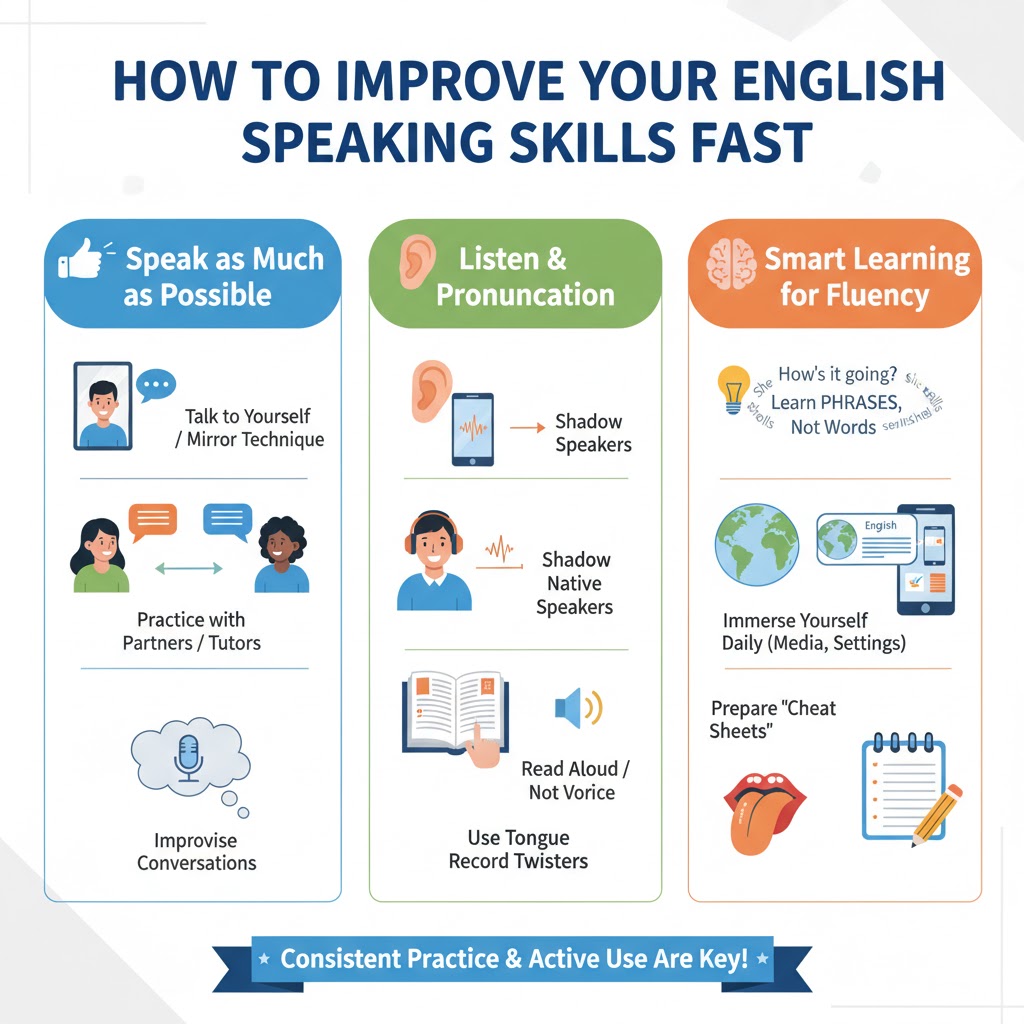
How to Improve Your English Speaking Skills Fast
Introduction
If you’ve ever frozen mid-sentence while trying to speak English, you’re not alone. Millions of students around the world can read and write English fairly well but when it’s time to speak, their confidence drops. According to Cambridge English, over 1.5 billion people are learning English globally, yet fluency remains one of the hardest skills to master.
Why? Because speaking is not just about knowing words it’s about using them naturally, confidently, and in real time. Whether you’re preparing for a job interview, studying abroad, or simply want to express yourself better, improving your spoken English can open countless doors.
In this guide, we’ll explore proven, fast, and practical ways to boost your English speaking skills. From mindset shifts and pronunciation practice to immersive learning methods and expert-backed tips, you’ll discover everything you need to start speaking English confidently fast.
1. Understand Why You Struggle with Speaking English
Before jumping into techniques, it’s essential to understand why many learners get stuck. Speaking requires combining vocabulary, grammar, pronunciation, and confidence all at once.
Here are the most common barriers students face:
-
Fear of mistakes: Worrying about grammar or pronunciation errors leads to hesitation.
-
Limited exposure: Only using English in class or exams reduces natural fluency.
-
Passive learning habits: Reading and listening without speaking keeps your brain in “input mode.”
-
Negative self-talk: Believing you’re “bad at speaking” becomes a self-fulfilling prophecy.
Language experts, including linguist Stephen Krashen, emphasize the importance of “comprehensible input and active output.” You can’t become fluent by listening alone you must use the language daily.
Actionable Tip: Record yourself speaking about any topic for 1 minute each day. Don’t focus on perfection—focus on expression. Over time, this reduces fear and builds fluency.
2. Build a Strong Foundation: Think in English
Fluency begins in your mind. Translating from your native language to English slows you down and increases mistakes. To speak faster, train your brain to think directly in English.
How to practice thinking in English:
-
Narrate your day mentally: “I’m making tea,” “I’m checking my phone.”
-
Replace inner monologues in your language with English.
-
Describe objects around you or plan your schedule in English.
A study from the University of Cambridge found that immersion even mental immersion improves language recall by up to 40%.
Actionable Tip: Try a “no-translation challenge.” For 10 minutes daily, think, plan, or talk to yourself only in English. This rewires your brain for faster recall and natural phrasing.
3. Focus on Pronunciation and Accent Neutralization
Clear pronunciation builds confidence and ensures people understand you. You don’t need a “perfect” British or American accent, but you do need clarity.
Expert Insight:
Dr. Jennifer Jenkins, author of The Phonology of English as an International Language, emphasizes that intelligibility not accent is what makes communication effective.
Tips to improve pronunciation fast:
-
Use phonetic tools: Websites like or the Oxford Learner’s Dictionary let you hear how native speakers pronounce words.
-
Shadowing technique: Listen to short clips (TED Talks, YouTube videos) and mimic the speaker word-for-word, matching rhythm and tone.
-
Focus on stress and intonation: English is a stress-timed language; some words are emphasized more than others. This creates natural speech flow.
Actionable Tip: Practice shadowing 5–10 minutes daily. Over a few weeks, you’ll notice your rhythm, pronunciation, and overall fluency improve dramatically.
4. Expand Vocabulary the Smart Way
Most students try to memorize long vocabulary lists but that’s not how native speakers learn. Instead, learn words in context, using collocations (words that naturally go together).
For example:
-
Instead of just learning “make,” learn “make a decision,” “make progress,” “make friends.”
-
Instead of memorizing “beautiful,” learn “beautiful scenery,” “beautifully designed,” “a beautiful day.”
This helps your brain retrieve words faster when speaking.
Actionable Tip: Use the “3x3 rule”:
-
Learn 3 new phrases each day.
-
Use each phrase in 3 sentences throughout your day.
Apps like Anki or Quizlet make spaced repetition easy and fun.
5. Surround Yourself with English Every Day
Immersion is key to fast improvement. Even if you live in a non-English-speaking country, you can create a digital English environment.
Simple immersion ideas:
-
Switch your devices (phone, laptop, apps) to English.
-
Follow English content creators on YouTube, TikTok, or Instagram who teach or speak naturally.
-
Listen to English podcasts during commutes try “BBC Learning English” or “The English We Speak.”
-
Join English-speaking online communities (Reddit, Discord, or language learning forums).
Immersive exposure helps your brain absorb natural expressions, idioms, and conversational patterns.
Actionable Tip: Dedicate at least 30 minutes daily to passive listening and 15 minutes to active speaking or shadowing.
6. Practice Speaking with Real People
No matter how much you study, fluency requires real conversation practice. Talking to real people helps you overcome hesitation and builds social confidence.
Where to find English-speaking partners:
-
Language exchange apps like HelloTalk, Tandem, or Speaky.
-
English conversation clubs in your city or online via Meetup or Facebook Groups.
-
Study groups or virtual classrooms where English is the medium of communication.
Pro Tip: Don’t only practice with native speakers non-natives with good fluency can be great partners too. The key is consistency and feedback.
Actionable Tip: Schedule two 15-minute speaking sessions per week with partners. Record them to review your pronunciation and vocabulary later.
7. Use Technology Wisely
AI tools and apps can accelerate your learning when used correctly.
Recommended tools:
-
Grammarly & QuillBot: For checking grammar and learning better phrasing.
-
Elsa Speak: Uses AI to correct pronunciation in real time.
-
ChatGPT (Conversation mode): Practice real-life dialogue or roleplay situations.
-
BBC Learning English / Coursera courses: Free structured lessons by experts.
Actionable Tip: Create a personal English improvement plan. Use one tool for pronunciation, one for writing, and one for conversation. Track your progress weekly.
8. Practice Real-Life Scenarios
One reason many students struggle is because they only practice academic English, not situational English. Practicing real scenarios builds immediate confidence.
Try these:
-
At a restaurant: Practice ordering food aloud.
-
In a meeting: Roleplay giving an update or opinion.
-
At an airport: Rehearse dialogues like “Where is Gate 12?” or “Can I check in my luggage?”
This situational approach makes you ready for real conversations rather than textbook examples.
Actionable Tip: Keep a “Speaking Journal.” Each day, write and say one real-world dialogue out loud.
9. Record, Review, and Reflect
Recording yourself is one of the most powerful yet underused techniques. It helps you notice pronunciation errors, pacing issues, and unnatural phrasing.
How to do it effectively:
-
Choose a topic and speak for 2 minutes.
-
Play it back listen for pronunciation, pauses, or repeated words.
-
Rewrite or re-record with improvements.
Actionable Tip: Compare recordings monthly to measure progress. This self-assessment builds awareness and motivation.
10. Stay Consistent and Motivated
Fluency doesn’t come overnight but progress does when you stay consistent.
Set SMART goals (Specific, Measurable, Achievable, Relevant, Time-bound).
Example:
-
“I will speak for 10 minutes daily for 30 days.”
-
“I will learn and use 3 new expressions each day.”
Reward yourself for milestones. Join online challenges like “Speak English 30 Days Challenge” for accountability.
Expert Insight:
According to Dr. Paul Nation, a leading researcher in vocabulary acquisition, “small, regular efforts produce faster fluency than irregular bursts of study.”
Conclusion
Improving your English speaking skills fast isn’t about mastering grammar overnight it’s about consistent practice, smart strategies, and fearless communication.
When you think in English, use it daily, and embrace mistakes as learning tools, fluency naturally follows. Combine modern tools, real-life scenarios, and immersion, and within weeks, you’ll notice a clear difference in your confidence and clarity.
Remember: the goal isn’t perfection it’s progress. Every word you speak brings you closer to the fluent speaker you aspire to be.
✅ FAQs: People Also Ask
1. How long does it take to become fluent in English?
With daily practice (30–60 minutes), most learners notice real improvement in 3–6 months. Full fluency depends on consistency and environment.
2. Is watching movies helpful for speaking English?
Yes but only if you actively listen, repeat phrases, and mimic dialogues rather than passively watching.
3. Should I focus on British or American English?
Choose the version most relevant to your goals (study, work, or travel). The key is clarity, not accent.
4. How can shy people practice speaking English?
Start by recording yourself, speaking to AI tools, or joining one-on-one online conversations before larger groups.
5. Can I learn English speaking without classes?
Absolutely. Many fluent speakers are self-taught through immersion, online tools, and consistent daily speaking practice.
Tags :
No Tags











0 Comments